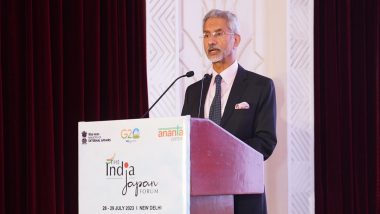New Delhi, July 28: External Affairs Minister S Jaishankar on Friday said that Japan has had a huge impact on India and in many ways, Japan is an "exemplary moderniser' for India. Speaking at the India-Japan Forum in the presence of Yoshimasa Hayashi, Minister of Foreign Affairs of Japan, Jaishankar said India is an indispensable partner to ensure a free and open Indo-Pacific and Tokyo would like to further expand cooperation in the region with New Delhi.
"What really does Japan means to India? Japan is in many ways the exemplary moderniser... It is an example of relevance. It’s also a country for which there is a lot of goodwill in history. Today under PM Modi, we also had great modernisation. A self-reliant India," Jaishakar said. "Japan is a natural partnership in this modernising India. Japan has truly unleashed the revolution in India. The Suzuki revolution! The second revolution was the metro revolution. The third revolution is the high-speed rail in making. The fourth revolution is in critical and emerging technologies and semiconductors," he added. 'Modi, Modi' Chants Echo in Rajya Sabha as S Jaishankar Makes Statement on India's Foreign Policy, Opposition MPs Shout 'INDIA, INDIA' (Watch Video).
S Jaishankar at India-Japan Forum:
Spoke at the India-Japan Forum today in New Delhi. Appreciate my colleague FM Yoshi Hayashi’s thought provoking ideas and views.
Made the following 6 points:
1.For India, Japan is the modernising inspiration that is particularly relevant as the Modi Government advances… pic.twitter.com/h7ayNPRd5u
— Dr. S. Jaishankar (@DrSJaishankar) July 28, 2023
#WATCH | EAM Dr S Jaishankar, says "There are some really important challenges in the world, like missile nuclear proliferation and terrorism & it is imp that we address root causes & root countries which are behind this & it is important that Japan & India are on the same page" pic.twitter.com/0g8BS8lbBy
— ANI (@ANI) July 28, 2023
Jaishankar listed out examples of the impact that Japan has made in India in terms of technology and the four main revolutions from Japan that had created an impact in India. "I think Japan has truly unleashed a number of revolutions in this country. There is the Maruti revolution where it wasn't just the Suzuki car coming in. It was an entire lifestyle, it was thinking, it was an industrial culture which got changed," Jaishankar said. 'Has India-China Border Dispute Resolved?' Asks Congress on EAM S Jaishankar's Claim.
"The second revolution was the metro revolution. I think it's had a very profound impact on the urban infrastructure of India. The third revolution is in the making, which is the high-speed rail," the external affairs minister said.
Jaishankar said that once the high-speed rail project would be completed, people will see in India what an enormous ripple impact it has even on the social habits of people.
"The fourth revolution which I see on the horizon is emerging in critical technologies and the semiconductor sphere. I believe that there is a huge potential for us to work on," Jaishankar said. "If put cumulatively, Japan's had a very powerful impact on manufacturing in India, on our urbanization process, on the organization of logistics in this country," the external affairs minister said.
The Japanese Foreign Minister had arrived in New Delhi earlier on Thursday. Jaishankar and Yoshimasa Hayashi held the 15th India-Japan Foreign Ministers' Strategic Dialogue in New Delhi on Thursday. The meeting provided an opportunity to review the progress made in the India-Japan Special Strategic and Global Partnership.
The two ministers engaged in comprehensive discussions covering a wide range of issues of bilateral, regional, and global significance. They highlighted the importance of further strengthening India-Japan partnership based on shared values and principles. The ministers emphasized the importance of achieving the target of JPY 5 trillion Japanese investment in India in the period 2022-27. They explored potential areas of collaboration in critical and emerging technologies, including semiconductors; resilient supply chains; and digital public infrastructure, among others.
During the meeting, the ministers also expressed satisfaction with the strengthening of defence and security cooperation, including regular exercises and staff talks between all three services. In this context, they discussed a way forward to deepen defence equipment and technology co-operation. The ministers exchanged views on regional and global issues of interest.
(This is an unedited and auto-generated story from Syndicated News feed, LatestLY Staff may not have modified or edited the content body)













 Quickly
Quickly




















